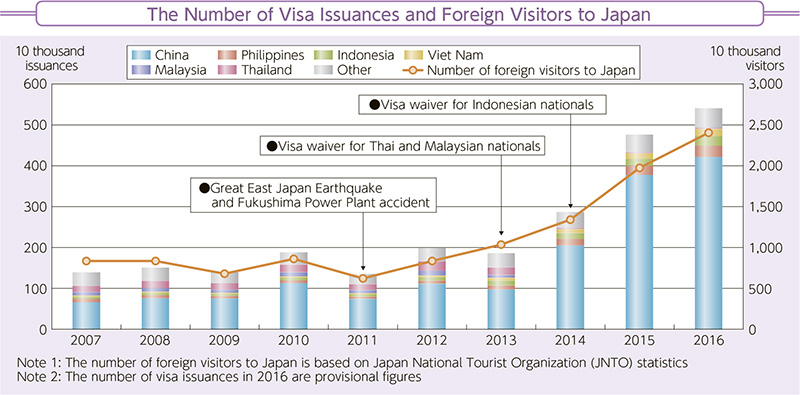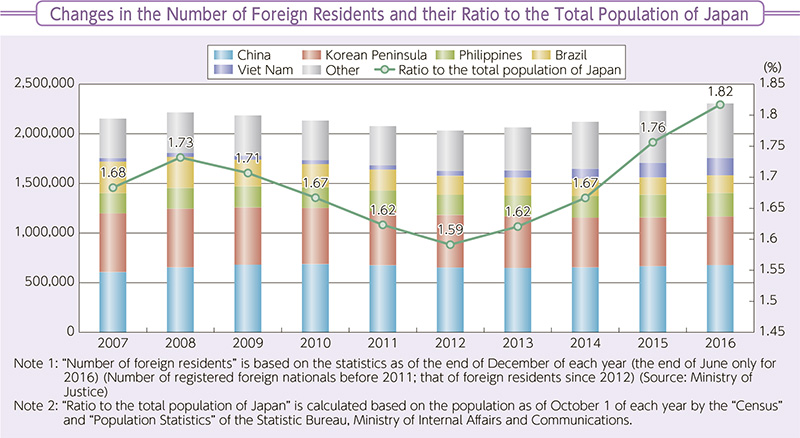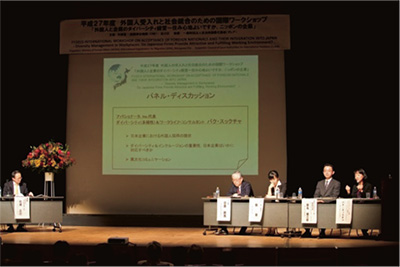Diplomatic Bluebook 2017
Chapter 4
Japan's Diplomacy Open to the Public
1.Linking the Energy of Foreign Nationals to the Growth of Japan
(1) Growth Strategy and Relaxation of Visa Requirements
In 2016, the number of foreign visitors to Japan reached the highest record of 24 million exceeding 20 million a year for the first time. The Government set new goals of the number of foreign visitors to 40 million in 2020 and 60 million in 2030 in the “Tourism Vision to Support the Future of Japan” issued at the end of March 2016. In the Vision, it is stated that the government would engage in strategic relaxation of visa requirements for the five countries: China, Russia, India, Philippines and Viet Nam, for which visas are required to visit Japan despite their high market potential to attract tourists. The concrete measures taken were published in the Tourism Vision Realization Program 2016 adopted by the Ministerial Council on the Promotion of Japan as a Tourism-Oriented Country in May. Based on these, MOFA has engaged in examining and implementing strategic relaxation of visa requirements not only for these five countries but also for other countries from the perspective of promoting people-to-people exchanges and strengthening bilateral relations, etc. To be specific, relaxation of multiple entry visa for Indian nationals as of January 11, the relaxation of multiple entry visa for business purposes for Vietnamese and Indian nationals as of February 15, introduction of multiple entry visa for Qatari nationals as of October 3, and the relaxation of multiple entry visa for business purposes and simplification of applications for students, etc. for Chinese nationals as of October 17 have been implemented. Furthermore, the simplification of visa application procedures for Indian students and the expansion of the number of visa application sites, announced on the occasion of Indian Prime Minister Modi's visit to Japan in November 2016, have been implemented since February 2017. Moreover, the introduction of multiple entry visas for tourism purposes, etc. for Russian nationals were announced on December 16, 2016 on the occasion of Russian President Putin's visit to Japan, and has been implemented since January 1, 2017.
As described, further expansion of relaxation of visa requirements is expected as it has the effect on promoting people-to-people exchanges and Japan's economic growth. On the other hand, the Government intensifies visa control as a part of border measures to prevent the entry of criminals and foreign visitors with intension of illegal labor, as well as those who could become victims of human trafficking. MOFA is determined to continue working on the relaxation of visa requirements, aiming at increasing the number of visitors to Japan while ensuring that “Japan, the safest country in the world,” and contributing to achieve a tourism-oriented country both in quality and quantity and attract the wealthy class, repeat visitors, and the young generation. Also, MOFA intends to conduct such relaxation of visa requirements with taking into account all the factors such as the bilateral relations and their diplomatic significance.


(2) Acceptance of Foreign Nationals and their Social Integration
Since the Lehman Shock in 2008, the number of long-term foreign residents in Japan had kept decreasing until 2012 when the trend turned upward. While the aging of the population continues with low birth rate resulting in the decrease of the population, it is important for Japan to secure capable human resources, irrespective of their nationality, in order to further vitalize Japan's economy and improve its competitiveness. The “2016 Revised Japan Revitalization Strategy” specifically aims at an effective utilization of foreign human resources, and it is expected that the number of competent foreign nationals living in Japan will further increase in the future.
MOFA cooperates with the relevant ministries and agencies to assure the series of measures to be considerable and effective to the principle of human rights of the foreign nationals. MOFA also hosts “International workshops on the acceptance of foreign nationals and their integration into Japan”, aiming to encourage debate among the people by providing opportunities to discuss concrete challenges and measures. In February, MOFA co-hosted a workshop with Shinagawa Ward and the International Organization for Migration (IOM) under the theme of “Diversity Management in Workplaces: Do Japanese Firms Provide Attractive and Fulfilling Working Environments?” The participants mainly discussed the environment in Japanese companies and how Japanese and foreign nationals should work together.
In June, MOFA and the Tokyo Metropolitan Government co-hosted the Disaster Management Seminar for Diplomatic Missions and Foreign Delegations in Tokyo, focusing on the theme of foreign tourists' safety and relief at the time of disasters, considering the Tokyo Olympic and Paralympic Games taking place in 2020.
 International workshop on the acceptance of foreign nationals and their integration into Japan (February 26, Tokyo)
International workshop on the acceptance of foreign nationals and their integration into Japan (February 26, Tokyo)